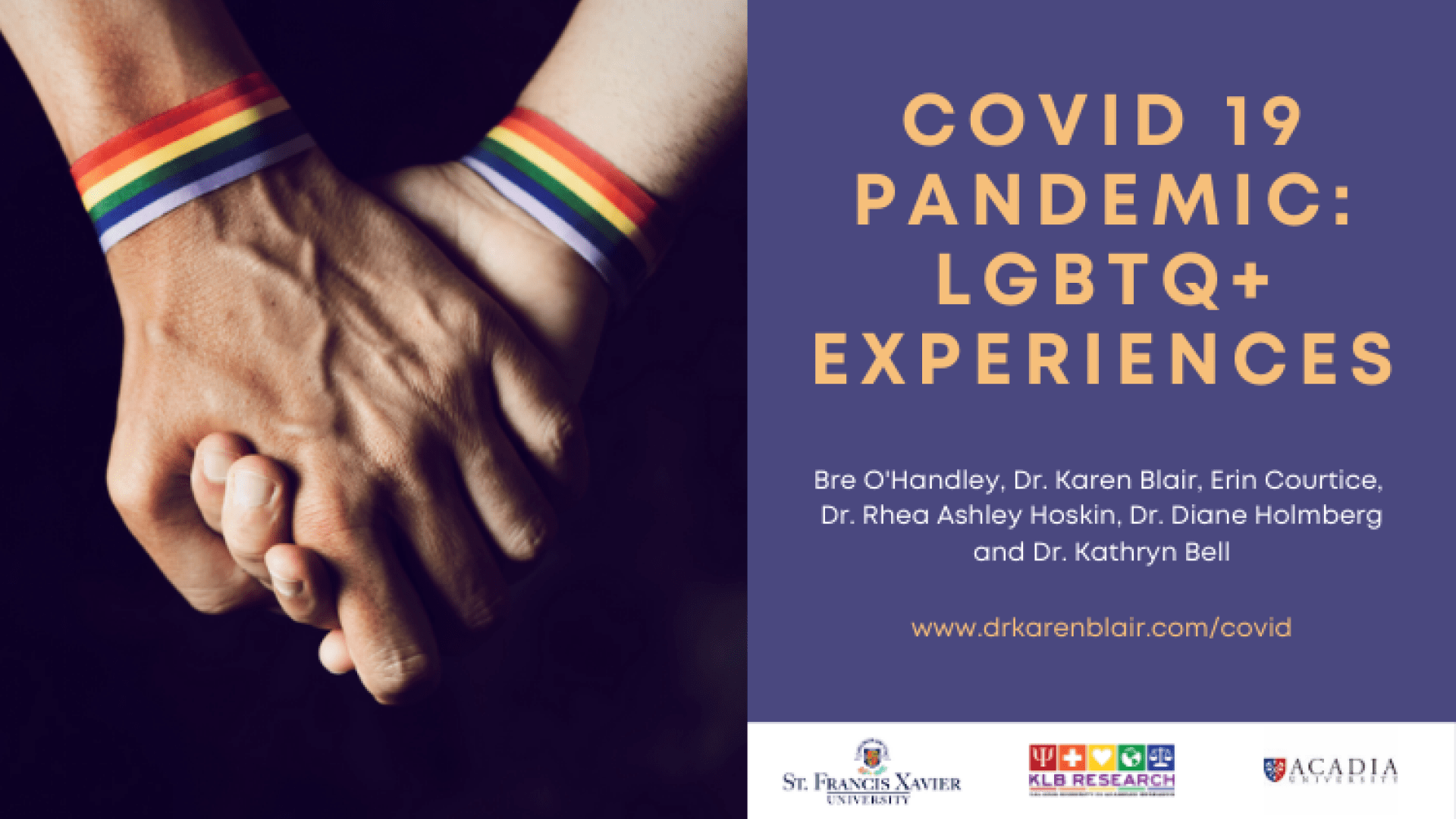
A COVID-19 Pandemic: LGBTQ+ Experiences report, led by StFX psychology professor Dr. Karen Blair, Dr. Diane Holmberg, Acadia University, and Dr. Kathryn Bell, Acadia University, has found that LGBTQ+ Canadians were faring worse during the COVID-19 pandemic than their cisgender and heterosexual counterparts.
In the study, funded by the Nova Scotia COVID-19 Health Research Coalition, LGBTQ+ participants reported lower levels of social support, income, mental and physical well-being, more engagement in avoidant coping, as well as lower ability to engage in World Health Organization recommendations regarding COVID-19.
LGBTQ+ participants’ responses also indicated that they were experiencing identity specific struggles, such as decreased access to community supports and gender affirming care, that may play a role in their lower levels of mental well-being.
“I found it surprising at first that LGBTQ+ Canadians reported less engagement in World Health Organization recommendations regarding COVID-19, such as staying home, regular hand washing and avoiding contact with others,” says StFX alumnus and past StFX Gender and Sexual Diversity Advisor Bre O’Handley, who is a current graduate student supervised by Dr. Blair and authored the LGBTQ+ Experiences report.
“However, LGBTQ+ participants reported that following these recommendations wasn’t feasible for them, which makes sense looking at other findings from the report where LGBTQ+ Canadians, especially transgender and non-binary Canadians, were more likely to be working in spaces where it was difficult to avoid close contact with others and in jobs that did not allow them to work from home.”
Dr. Blair noted the study provided paid and volunteer experience to over 25 students this summer from a variety of institutions including Acadia, StFX, Trent, University of Victoria, University of Ottawa and Queen’s.
FINDINGS SHARED
Dr. Blair says the findings of the COVID-19 Pandemic: LGBTQ+ Experiences report will be shared directly with Canadian organizations focused on serving LGBTQ+ communities, such as EGALE Canada, The Youth Project (based in Halifax, NS) and the StFX Gender and Sexual Diversity Office, among others.
The findings of the report will also be shared widely through social media, such as Twitter and Instagram, and the report can be found on Dr. Blair’s website.
“The LGBTQ+ Experiences report may prove helpful for these organizations and for Nova Scotia public health in highlighting the unique experiences of LGBTQ+ Canadians during COVID-19,” says Bre O’Handley.
“In knowing that LGBTQ+ Canadians are experiencing increased mental distress and less social support than non-LGBTQ+ Canadians, as well as a loss of LGBTQ+ affirmative community and reduced access to gender affirming medical services, LGBTQ+ organizations and Nova Scotia public health can better determine how to support LGBTQ+ Canadians during COVID-19. LGBTQ+ organizations may choose to focus on offering socially distanced or online community spaces for LGBTQ+ individuals to help fill the gap of LGBTQ+ affirmative social support. Nova Scotia public health may choose to consider how they support transgender Nova Scotians in accessing gender affirming medical services, such as hormone replacement therapy, during the pandemic.”
The report is part of a larger study, “The Ties that Bind: Interpersonal relationships as a source of risk and resilience during the COVID-19 pandemic.”
This study compared Nova Scotians’ wellbeing and coping during the COVID-19 pandemic with other jurisdictions, assessed LGTBQ+ Canadians’ wellbeing and coping during the pandemic relative to non-LGBTQ+ Canadians, and examined Nova Scotians’ experiences with intimate partner violence during the pandemic in comparison to other jurisdictions.
Dr. Blair said this study will address a gap in the knowledge about the risk and resiliency of Nova Scotians and LGBTQ+ Canadians during a time of physical distancing and stay-at-home orders and will offer insights into appropriate mental health and policy solutions.
SURVEY PARTICIPANTS
The participants included in the LGBTQ+ Experiences report included 2,266 Canadians who participated in the COVID-19 Interpersonal Coping Study during the months of May and June. Seven hundred and ninety-four of these participants identified as part of the LGBTQ+ community (228 of which identified as transgender) and 1,468 did not (four participants did not provide enough information to determine which of these groups they belong to). Of the participants, 39.3 per cent were currently located in Nova Scotia, 29.8 per cent in Ontario, 10.2 per cent in British Columbia, and the remainder were dispersed among the other provinces and territories.
The sample of LGBTQ+ Canadians in the LGBTQ+ Experiences report were younger, more likely to be racialized and reported lower income than the non-LGBTQ+ Canadians included in the report. Analyses were run to control for these differences in demographics between the two groups.
Other results from the survey will be coming out soon. A report summarizing the data collected from the survey focusing on factors that influence mask wearing, a report focused on Canadians’ experiences of intimate partner violence, and a report focused on Nova Scotians’ experiences during the COVID-19 pandemic will all be coming out in early September.

